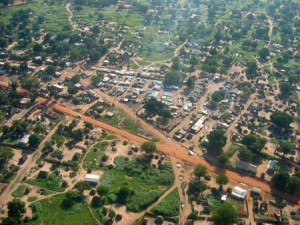South Sudan is the newest country in the world, born in July of 2011. For the first time in history people were able to go to the polls and over 99% of them voted for freedom. It was a time of joy and excitement as people looked forward to living in a free and prosperous country. But it was not to be. For much of the past 50 years the black southern Sudanese have been at war with the Arabs of northern Sudan – over 2 million lives have been lost. Having a common enemy forced the southerners to unite. But now the common enemy is no longer there and they have turned on themselves.
To understand South Sudan it is important to realize it is made up of over 90 ethnic groups – each having their own identity and speaking their own language. The largest group by far is the Dinka, numbering about 3 million people. The second largest is the Nuer, numbering over 1 million. When the new government was formed these two groups immediately dominated the new administration. The President of the country is Salva Kiir, a Dinka. The Vice President is Riek Machar, a Nuer. These two ethnic groups have similar cultural backgrounds. They are both pastoralist societies who love their cattle. But over the centuries they have fought each other for cattle and access to pasture and water. Sadly they have brought these longstanding enmities into the new government.

Many western countries have come to help get this country started. South Sudan is a country with great potential, having large quantities of oil, gold, wildlife and arable land. Juba, the southern capital, has become a boomtown with expatriate organizations struggling to find housing. When I visited there last year I saw apartments going for $6000 a month and offices renting for $80,000 a year. Money has poured in to help prop up the new government, but much of it has disappeared into the private accounts of corrupt politicians. South Sudan is presently rated as one of the three most corrupt countries in the entire world.
Several months ago President Kiir decided to do something about it and dismissed most of the ministers in his government – this included his Vice President Machar and the other Nuer ministers. This caused ill feelings and in December fighting erupted in the capital Juba. Each politician had his own unit of trained bodyguards made up of either Dinka or Nuer soldiers and they started fighting each other. The fighting quickly spread and engulfed the town of Juba. The Dinka soon controlled the town, but actively pursued and killed Nuer people. The opposite happened in other towns where Nuer dominated and they killed Dinka people. Many civilians fled to the various UN compounds for safety. The UN compound in Juba is protecting over 20,000 people who are camping on the premises.
The fighting has become increasingly ugly across Jonglei province with armed militias killing anyone of the opposing ethnic group – often targeting women, children and old people. They are even entering hospitals and shooting sick people in their beds. The latest figures estimate that over 10,000 people have been killed and over 700,000 people are displaced – hiding in the bush without adequate food and water. Even humanitarian groups trying to supply emergency aid have been attacked and been forced to withdraw their services.
There have been ongoing peace talks in Addis Ababa, Ethiopia. Initially these were heading nowhere as each side continued to fight. But a peace agreement has now been signed by negotiators on both sides. It is well worded and demands an immediate cessation of hostilities. However, many of the militias operate in remote areas and there is no central control over these fighting groups. So fighting continues. Word needs to get out to these militias with orders to stop fighting. There also needs to be guarantees of safety so the humanitarian organizations can get into the country and offer immediate aid.
Civilians are fleeing to Uganda at the rate of over 1000 a day – joining the 50,000 refugees that are already there. Most of them are walking and are in bad physical shape. The high numbers have seriously stretched the ability of the humanitarian organizations to feed and house them. The refugees interviewed have no faith in the peace agreement and many are stating that they want to live in Uganda and never return to South Sudan.
Sadly the atrocities and killings have renewed deep hatreds between the ethnic groups and created a desire for revenge. A diplomat stated that this fighting has set the country back 20 years. Fortunately there is a strong church in South Sudan. The church leaders are united and pleading with their people to forgive and live in peace. Forgiveness is their only hope.
